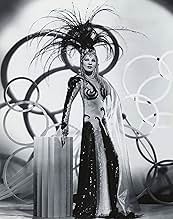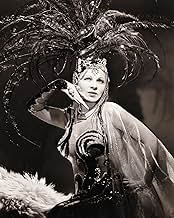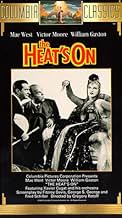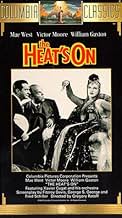AVALIAÇÃO DA IMDb
5,1/10
484
SUA AVALIAÇÃO
Adicionar um enredo no seu idiomaWhen his biggest star joins a rival's show, a Broadway producer bluffs and schemes to get her back.When his biggest star joins a rival's show, a Broadway producer bluffs and schemes to get her back.When his biggest star joins a rival's show, a Broadway producer bluffs and schemes to get her back.
- Direção
- Roteiristas
- Artistas
Leon Belasco
- Shore - the Agent
- (não creditado)
Beatrice Blinn
- Babette
- (não creditado)
Avaliações em destaque
I'm a big fan of Mae West, and I waited for years to see this insignificant, forgettable little movie. Although I knew it had gotten bad reviews at the time of its release--- and West herself didn't like it any more than the critics did--- I thought there still might be something in it worth seeing, since it holds such an important place in her career: this was the final movie of her 1930s/1940s "movie star" period. After it was done, West returned to live stage work, recording sessions, and of course her famous nightclub act of the 1950s. She was not to make another film for 27 years (at which time she did the rather infamous "Myra Breckinredge" in 1970).
Seeing "The Heat's On" is an exercise in tedium. I had to literally struggle to stay awake during it. It's not that it's all that horrendously "bad"--- heck, even bad movies can be entertaining for the wrong reasons. This one is just....empty. Completely vapid and forgettable. It's easy to understand why Mae West practically disowned this movie.
The main thing wrong with it is that she isn't in it nearly enough. For the entire first hour, I swear that West had about 6 minutes of total screen time, scattered throughout in a series of VERY short "blink and you'll miss it" scenes. She's got more charisma and screen presence, by far, than anybody else in this thing--- when she's on, you can't take your eyes off her. But you hardly get to see her! Giving West more screen time would have improved this movie immensely, and it's a mystery to me why director Gregory Ratoff didn't understand that.
What makes her absence from the screen even more frustrating, if not downright puzzling, is that so much of this movie is a revue/type *musical* (in neon lights), the type of film that could have shown her at her absolute best. But instead you get one lame song after the other filling the screen; there are singers, dancers, production numbers, showgirls, Latin-flavored guitarists, even a boogie-woogie pianist/singer (blues and jazz great Hazel Scott, playing herself). They all come in, do their thing, leave, and it's on to the next song. With the singular exception of Scott, who is wonderful--- all of this is absolutely and completely forgettable. Most of the singers, the dancers, the songs, the movie itself: it's "B"-grade material at best. We aren't talking MGM-quality here, folks.
Watching this parade of musical mediocrities go by, all you can think of the entire time is "Where IS Mae West??! Why don't they bring her on?" But it never happens until the very end, at which time you'll be practically asleep if you've managed to sit through it all up to that point. It's hard to imagine who might be a fan of this picture.
For what it's worth, West does look pretty good. Always proud of her youthful appearance, she was 50 years old here, but she looks maybe 40-ish, and she's dressed in stylish, contemporary clothes for one of the very few times in her screen career. (Well, except for her very first musical number, in which--- amusingly--- she's in her trademark "gay 90s" garb, looking much like she did in her earlier films).
The story--- what flimsy plot there is of it--- has something to do with Broadway musical star Fay Lawrence (West) getting funding for her next show, and having producers fight over her. But the main point of this movie, and the most amount of screen time, is devoted to the endlessly boring musical numbers. Gentle, befuddled Victor Moore is the primary male lead; and a YOUNG Lloyd Bridges--- yes, he was young once!--- has a featured part as a soldier engaged to Moore's niece.
Not a bad movie, just a boring one, and it missed the boat all around. Mae West deserved better.
Seeing "The Heat's On" is an exercise in tedium. I had to literally struggle to stay awake during it. It's not that it's all that horrendously "bad"--- heck, even bad movies can be entertaining for the wrong reasons. This one is just....empty. Completely vapid and forgettable. It's easy to understand why Mae West practically disowned this movie.
The main thing wrong with it is that she isn't in it nearly enough. For the entire first hour, I swear that West had about 6 minutes of total screen time, scattered throughout in a series of VERY short "blink and you'll miss it" scenes. She's got more charisma and screen presence, by far, than anybody else in this thing--- when she's on, you can't take your eyes off her. But you hardly get to see her! Giving West more screen time would have improved this movie immensely, and it's a mystery to me why director Gregory Ratoff didn't understand that.
What makes her absence from the screen even more frustrating, if not downright puzzling, is that so much of this movie is a revue/type *musical* (in neon lights), the type of film that could have shown her at her absolute best. But instead you get one lame song after the other filling the screen; there are singers, dancers, production numbers, showgirls, Latin-flavored guitarists, even a boogie-woogie pianist/singer (blues and jazz great Hazel Scott, playing herself). They all come in, do their thing, leave, and it's on to the next song. With the singular exception of Scott, who is wonderful--- all of this is absolutely and completely forgettable. Most of the singers, the dancers, the songs, the movie itself: it's "B"-grade material at best. We aren't talking MGM-quality here, folks.
Watching this parade of musical mediocrities go by, all you can think of the entire time is "Where IS Mae West??! Why don't they bring her on?" But it never happens until the very end, at which time you'll be practically asleep if you've managed to sit through it all up to that point. It's hard to imagine who might be a fan of this picture.
For what it's worth, West does look pretty good. Always proud of her youthful appearance, she was 50 years old here, but she looks maybe 40-ish, and she's dressed in stylish, contemporary clothes for one of the very few times in her screen career. (Well, except for her very first musical number, in which--- amusingly--- she's in her trademark "gay 90s" garb, looking much like she did in her earlier films).
The story--- what flimsy plot there is of it--- has something to do with Broadway musical star Fay Lawrence (West) getting funding for her next show, and having producers fight over her. But the main point of this movie, and the most amount of screen time, is devoted to the endlessly boring musical numbers. Gentle, befuddled Victor Moore is the primary male lead; and a YOUNG Lloyd Bridges--- yes, he was young once!--- has a featured part as a soldier engaged to Moore's niece.
Not a bad movie, just a boring one, and it missed the boat all around. Mae West deserved better.
This mild little film is like untold dozens of minor musicals from the 1940's that were ground out by Columbia and Universal and pretty much forgotten and unseen since original release. What keeps this one in circulation is the fact that it top lines no less than Mae West, one of the cinema's greatest women stars. West was now on the eve of 50 when the movie was made, a good 20 years and then some older than most of the pinup girls that were packing in the moviegoers of the era. Presumably her limited options in Hollywood at the time persuaded to take a chance on this Gregory Ratkoff production. She took the project seriously enough to slim down, looking sensational in some gorgeous Walter Plunkett gowns and clearly spiced up some of her scenes with some uncredited but unmistakable original wisecracks. Alas, far too much time is given to musical numbers by other performers although glamorous black jazz artist Hazel Scott is fantastic in her productions. There is also perhaps a bit too much time given to the male leads, William Gaxton and Victor Moore, highly regarded Broadway stars of the era (co-stars in fact in four stage hits) but not actors who can carry a film. Even though the cast is talented and some of the musical numbers are quite good (I actually enjoyed Moore's comic number "They Never Look as Pretty as the Package"), you keep waiting for Mae West to appear on the scene again. I suspect this was true even in 1943 when her popularity was at a low point.
Mae West nevertheless manages to score some wonderful moments, notably the comic scene when Victor Moore comes up to see her sometime. Almost as good is West's confrontational scene with Moore's blue nose sister, character actress Almira Sessions. (It's interesting to note the film is one of the few times West is surrounded by performers older than herself, Gaxton, Sessions, and Moore have several years on her which may be part of the reason West looks fairly youthful in the movie in addition to being well-preserved). Starlet Mary Roche is featured as Moore's niece who longs for a show business career, her one musical number "Walbash" is actually quite pleasant but this is apparently her only film appearance, she later became a hairdresser in the film industry if that is indeed the same Mary Roche.
Some like it hot and this movie ain't so hot but we have so few Mae West movies to enjoy it is to be cherished in a way for another glimpse at one of America's great pop culture phenomenons.
Mae West nevertheless manages to score some wonderful moments, notably the comic scene when Victor Moore comes up to see her sometime. Almost as good is West's confrontational scene with Moore's blue nose sister, character actress Almira Sessions. (It's interesting to note the film is one of the few times West is surrounded by performers older than herself, Gaxton, Sessions, and Moore have several years on her which may be part of the reason West looks fairly youthful in the movie in addition to being well-preserved). Starlet Mary Roche is featured as Moore's niece who longs for a show business career, her one musical number "Walbash" is actually quite pleasant but this is apparently her only film appearance, she later became a hairdresser in the film industry if that is indeed the same Mary Roche.
Some like it hot and this movie ain't so hot but we have so few Mae West movies to enjoy it is to be cherished in a way for another glimpse at one of America's great pop culture phenomenons.
5tavm
Well, after 40 years of reading about this movie, my curiosity has finally been settled! Her last movie before this one-My Little Chickadee-having been released three years previous, Mae West makes one more picture before taking a 27-year sabbatical from Hollywood. However, because she didn't write her material like before, she doesn't have much witty lines and in fact, has small screen time despite her above-the-title billing which she shared with William Gaxton and Victor Moore, both of whom have more scenes. It's with Moore that Ms. West has her one good scene with as she manages to get him drunk while he reveals the crux of the plot. Otherwise, this film is just an excuse to provide musical numbers of either Mae, Xavier Cugat and his Orchestra, or the excellent singing and piano skills of Hazel Scott and excellent Ms. Scott really is! If anyone makes this picture worth seeing, she does! P.S. Lloyd Bridges has a small role as a soldier who visits his girlfriend played by Mary Roche who's only appearance on film this was.
At 49, Mae West appeared in this bagatelle produced and directed by her friend, Gregory Ratoff, who needed a name actor to justify the production, but the main character is a hapless bumpkin, well played by Victor Young. Nearly three decades passed before she appeared in another movie. Even more odd was the brief career, as an actress, of pretty, charming Mary Roche, who played Young's niece, although she went on to work as a hair stylist on eight features, three of them very important ones, beginning with "On the Waterfront" (1954). This story of an attempt to put on a Broadway show goes in one ear and out the other, except for Xavier Cugat and his orchestra and the amazing piano playing of Hazel Scott, who even plays two pianos at once.
Broadway star Fay Lawrence (Mae West) wants out of her contract with producer Tony Ferris (William Gaxton). She can do it if the show does badly. A society foundation shuts them down and she jumps to rival Forrest Stanton. Tony is willing to do anything to get her back including using the same foundation and its hapless vice president Hubert Bainbridge (Victor Moore) who wants to help his niece's performing ambitions.
This is Mae West's last theatrical release before making a semi-return some three decades later. She delivers her style of comedy with less sexuality. There is some music. The songs may be appealing to some. For most of this, the lead character is actually Ferris. He's not that compelling or appealing with all his scheming. If this was written by Mae West, she would probably be the lead from the start. She does take over in the last act and that's a good section. If only the movie has more of those.
This is Mae West's last theatrical release before making a semi-return some three decades later. She delivers her style of comedy with less sexuality. There is some music. The songs may be appealing to some. For most of this, the lead character is actually Ferris. He's not that compelling or appealing with all his scheming. If this was written by Mae West, she would probably be the lead from the start. She does take over in the last act and that's a good section. If only the movie has more of those.
Você sabia?
- CuriosidadesThis was Mae West's final film until Homem e Mulher Até Certo Ponto (1970) 27 years later.
- Erros de gravaçãoOn a wall of a producer's office is a presumably old publicity shot of Fay wearing an elaborate headdress that she doesn't actually wear until she performs a musical number later in film for an entirely new production staged by rival producer.
- Citações
Fay Lawrence: [singing] If you want things put in order, Come and see me south of the border...
- Trilhas sonorasI'm Just a Stranger in Town
(1943)
Music by Jay Gorney
Lyrics by Henry Myers and Edward Eliscu
Copyright 1944 by Mills Music Inc.
Performed by Mae West (uncredited) in the show "Indiscretions"
Principais escolhas
Faça login para avaliar e ver a lista de recomendações personalizadas
Detalhes
- Tempo de duração1 hora 19 minutos
- Cor
- Proporção
- 1.37 : 1
Contribua para esta página
Sugerir uma alteração ou adicionar conteúdo ausente



































